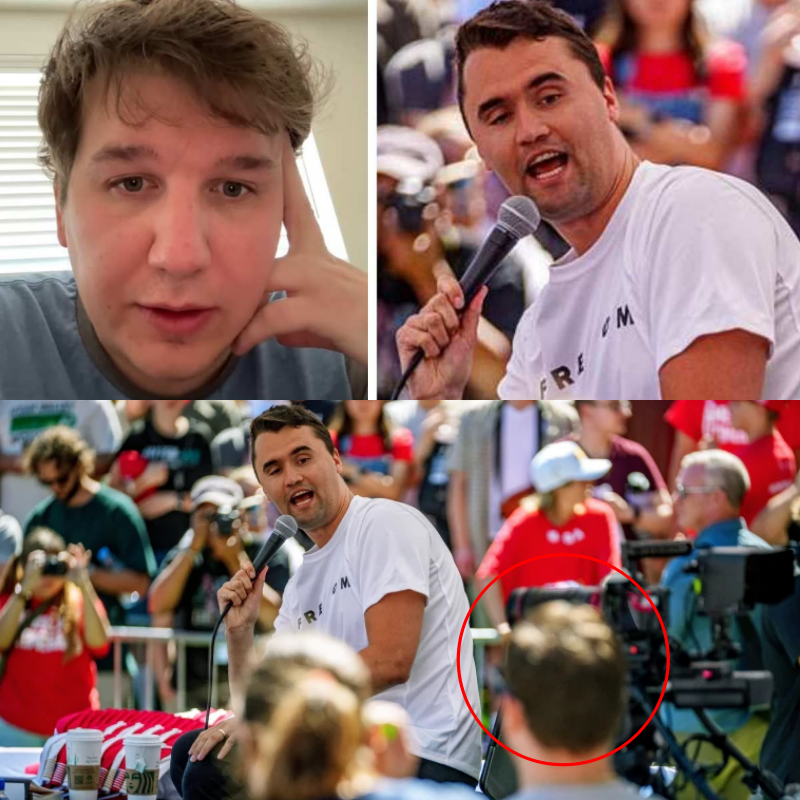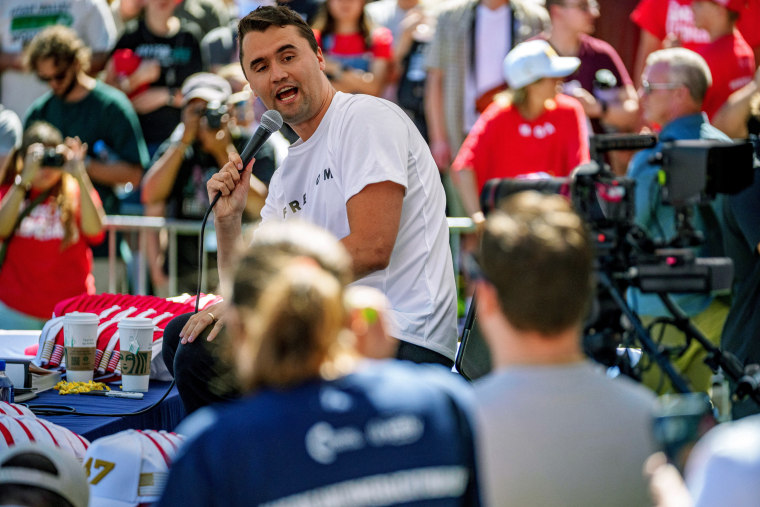Man Who Debated Charlie Kirk Moments Before Shooting Breaks His Silence—His Truth Shakes the Left
In the aftermath of the shocking shooting that claimed the life of conservative activist Charlie Kirk, the man who was debating Kirk at the very moment shots rang out has stepped forward to share his story. His words, raw and reflective, have sent ripples through political circles, challenging assumptions and igniting a broader conversation about civility, violence, and the true cost of political division in America.
The Last Conversation
The day had started like any other at Utah Valley University. Charlie Kirk, founder of Turning Point USA and a lightning rod in conservative politics, was on campus as part of his nationwide “Prove Me Wrong” tour—an initiative designed to foster dialogue between people of opposing viewpoints. The event drew hundreds of students, faculty, and community members, all eager to witness the clash of ideas.
Among the crowd was a mathematics student, known online for his progressive views and outspoken criticism of Kirk. He had prepared for this moment, determined to challenge Kirk on his statements about transgender Americans and mass shootings. The exchange was tense but civil, emblematic of the kind of debate Kirk encouraged.
“I asked Charlie how many transgender Americans had been mass shooters in the last ten years,” the student recalled in a video posted to social media less than 24 hours after the tragedy. “He said the number was five, and CNN fact-checked me and said I was right. But that wasn’t the point—I wanted to show that the left is overwhelmingly peaceful, that violence isn’t our way.”
But then, as the student finished his question and Kirk began to respond, chaos erupted. Shots rang out in the auditorium, sending the crowd scrambling for cover. In an instant, the debate was replaced by fear, confusion, and tragedy.
.
.
.

Grappling With Tragedy
The student’s video, posted in the hours following the shooting, was raw and emotional. “I don’t know how to make this video,” he admitted, voice trembling. “It’s been a rough 24 hours. I was the last person to talk to Charlie Kirk. And now he’s gone.”
He spoke candidly about the impact Kirk’s death had on him—not just as a political adversary, but as a fellow human being. “Charlie had two kids and a wife. I have two kids and a wife. His one-year-old boy will grow up without memories of his dad. It’s a tragedy, and I don’t know how to grapple with it.”
The student’s admission stunned many on the left. Despite his deep disagreements with Kirk, he refused to celebrate or exploit the tragedy. Instead, he called for peace and empathy, urging his followers to reject conspiracy theories and online speculation about his involvement.
“I’ve been talking to the police. We are good. Thank you. If you’re salivating about what happened, you’re not helping anything. If you’re part of my audience and you’re rejoicing, you’re not part of what I’m trying to build here.”
Online Speculation and Police Involvement
In the immediate aftermath of the shooting, social media was awash with speculation. Some questioned whether the student had set Kirk up, given the timing of the shooting—moments after a heated exchange about transgender issues. Others pointed to the student’s online presence and political leanings, fueling rumors and conspiracy theories.
But the student was quick to address these allegations. “I’ve spoken with the police. They know where to find me. I trust in the professionalism and thoroughness of law enforcement to do their job and make sure that the right person is held accountable.”
His openness and willingness to cooperate with authorities surprised many, particularly on the left, where some had expected him to distance himself from the incident or exploit it for political gain. Instead, his message was one of unity and reflection.
Reactions Across the Political Spectrum
The shooting at Utah Valley University sparked outrage and grief across the country, but it also revealed unexpected moments of solidarity. Even some of Kirk’s fiercest critics paused to reflect on the tragedy, condemning political violence and calling for a return to civil discourse.
On “The View,” a show known for its progressive commentary, hosts expressed genuine sorrow for Kirk’s death. “Although we don’t all align with his views, what I deeply aligned with was his belief that when we stop talking, that’s when things get bad,” one host said. “The irony of being violently killed while saying those words—it’s heartbreaking.”
Other media figures echoed this sentiment, urging Americans to reject political violence and embrace dialogue. “There’s never a place for political violence,” said one commentator. “Actions speak louder than words, and it’s time for leaders on both sides to do better.”

The Importance of Dialogue and Tolerance
For many, the tragedy at Utah Valley University served as a stark reminder of the importance of dialogue and tolerance. Kirk’s “Prove Me Wrong” tour was built on the idea that Americans could disagree passionately while still respecting one another’s humanity.
As the student reflected in his video, “As much as I disagree with Charlie Kirk, he is still a human being. Have we forgotten that? I stand by so little of what he said, but one thing he stood by was conversation.”
The message resonated with viewers across the political spectrum, many of whom shared their own stories of disagreement and reconciliation. “If there’s one thing I learned from him,” the student said, “it’s that silence is surrender. So, if you’re watching this, don’t be silent. Speak even if your voice shakes.”
Political Rhetoric and Violence
The shooting reignited debates about the impact of political rhetoric on violence in America. Some commentators pointed to years of inflammatory language from both sides, warning that demonizing opponents could only lead to more tragedy.
“They’ve been calling President Trump a fascist, a would-be Hitler,” said one pundit. “They’ve called his supporters deplorables and garbage for years. What other outcome could you possibly expect if that’s the message you’re putting out there?”
Others called for an “off-ramp”—a way to deescalate tensions before they boil over into violence. “Usually in regards to war, you want an off-ramp so the violence doesn’t keep continuing. The same thing can be said here. We need to cool down the rhetoric, or it’s hard to imagine how this gets better.”
Media and Public Figures’ Responses
The media’s response to Kirk’s death was mixed. Some outlets mourned his passing and condemned the violence, while others questioned the right’s reaction, pointing to other political deaths that had received less attention.
But as one commentator noted, “When someone is of a certain public stature, they naturally get more attention. That has nothing to do with trying to politicize a tragedy.”
The conversation also touched on issues of tolerance within the conservative movement. Despite accusations from figures like Stephen King, who falsely claimed Kirk advocated stoning gay people, Kirk’s record showed a willingness to welcome gay conservatives into his movement.
“Politics is about addition and multiplication,” Kirk said at a Turning Point event. “We welcome you into the conservative movement. As Christians, we are called to love everyone.”
Final Thoughts: A Nation Reflects
In the days following the shooting, Americans from all walks of life paused to reflect on what had happened. The student who debated Kirk became an unlikely symbol of empathy and introspection, challenging his own beliefs and urging others to do the same.
“I hope it doesn’t have a chilling effect on your ability to speak your mind, whether you’re left or right,” he said. “We should be able to share our viewpoints without fear.”
The tragedy at Utah Valley University was a stark reminder of the fragility of civil discourse—and the urgent need to protect it. As the nation mourned the loss of Charlie Kirk, voices across the political spectrum called for peace, empathy, and a renewed commitment to dialogue.
For the student who debated Kirk in his final moments, the lesson was clear. “Speak, even if your voice shakes. Because when we stop talking, that’s when things get bad.”





